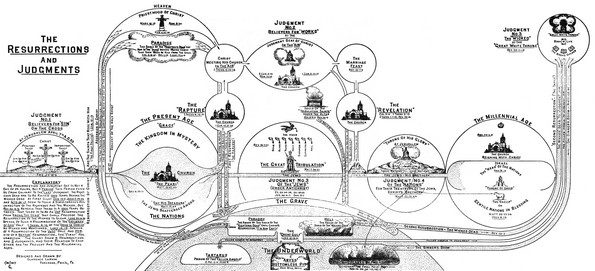
Bruce, you said “you said: “Christian orthodoxy teaches that when a person dies their body goes to the grave to await the resurrection of the just and unjust and the final judgment.” How then, could the rich man see and know Abraham and Lazarus and Abraham and Lazarus see the rich man?”
Can you explain where this “Dual Judgement” theology comes from, who originated it, and why not all fundies espouse it—like you did not espouse it in your quote above.
First, for those who may not know my entire story, I was not a Fundamentalist towards the latter part of my time in the ministry. I left the Independent Fundamentalist Baptist (IFB) church movement in the late 1980s. I then became an Evangelical Calvinist before becoming more liberal politically and theologically. When I left the ministry in 2005, I was aligned with the emergent church, red letter Christians, and Sojourners. My move leftward cost me almost all of my IFB friends and colleagues. When I became an agnostic/atheist/humanist, I lost all but two of my remaining Christian friends.
Second, when I wrote “Christian orthodoxy teaches that when a person dies their body goes to the grave to await the resurrection of the just and unjust and the final judgment,” this was a reflection of my post-IFB theology. I held to a post-tribulational, amillennial eschatology. One resurrection, one judgment.
Third, almost all IFB churches and pastors are dispensational, pre-tribulational, and premillennial. As such, they believe in multiple judgments. Lazarus and the rich man would have been judged before the death and resurrection of Jesus. Then there is a judgment after the rapture. This judgment is often called the Judgment (BEMA) Seat of Christ. At the end of the tribulation, there will be another judgment, and after the 1,000-year millennial reign of Christ on earth, there will be one more judgment, the final judgment of all who have not yet been judged.
Make sense? Of course not. But, it is in the B-i-b-l-e. Much of dispensational teaching is implied and inferred.
In recent years, I’ve noticed more eschatological diversity in the IFB church movement. I suspect this is due to the fact that all the prophecy preaching over the past 70 years has failed to materialize. After being theologically embarrassed and made out to be fear-mongering false prophets, many IFB preachers have turned to simpler eschatological systems. I’ve even met IFB preachers who are Calvinistic and hold to a post-tribulational, amillennial eschatology. Their eschatology and soteriology have evolved, but their social Fundamentalism has not. (please read Are Evangelicals Fundamentalists? to understand the terms social and theological Fundamentalism)
Bruce Gerencser, 68, lives in rural Northwest Ohio with his wife of 47 years. He and his wife have six grown children and sixteen grandchildren. Bruce pastored Evangelical churches for twenty-five years in Ohio, Texas, and Michigan. Bruce left the ministry in 2005, and in 2008 he left Christianity. Bruce is now a humanist and an atheist.
Your comments are welcome and appreciated. All first-time comments are moderated. Please read the commenting rules before commenting.
You can email Bruce via the Contact Form.

From what I’ve read, dispensationalist theology only dates back to the early 19th century. Church of Ireland minister John Newton Darby helped to develop the concept, and Cyrus Scofield popularized it in the United States with the Scofield Reference Bible. Darby is now best known as the founder of the Plymouth Brethren, who tend to be even more insular than the IFB.
So, Jesus raises the wicked dead out of hell only to send them to a worse hell? So much for Jesus being “good”.